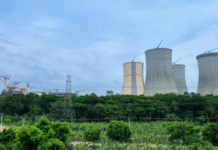
Sweden will give Bangladesh 1.6 billion Swedish krona, or Tk 1,659 crore, in development assistance in the next seven years.
The move is part of the Nordic country’s development strategy for Bangladesh for 2014-2020, announced yesterday at an event at the capital’s Amari Hotel.
The aim of the strategy is to: alleviate poverty; strengthen democracy, respect for human rights and gender equality; and contribute to sustainable development, it said in the strategy paper.
Last year, Sweden committed the same amount as development assistance for Bangladesh.
While speaking on the key areas of the new strategy, Isabella Lövin, Swedish minister for international development cooperation, said it has a long-term perspective — realising the results achieved and focusing on some remaining challenges.
“It also takes into account the aim of the government of Bangladesh to become a middle-income country by 2021. And I am certain this aim can be reached in a sustainable and inclusive way.”
Lövin said Sweden has supported Bangladesh’s own development agenda for many areas, particularly in health and education, where the Scandinavian country has supported sector programmes for almost 30 years now.
Sweden’s contribution to the health sector programme in Bangladesh is the Nordic country’s largest anywhere in the world, she said.
In both the sectors Bangladesh has achieved “impressive results” and is expected to reach the Millennium Development Goals set up almost 15 years ago.
Lövin said despite Bangladesh’s astonishing recent economic growth of around 6 percent per year, challenges still remain.
“In order to address these, we would like to continue our dialogue with the Bangladeshi government, development partners, and other actors in the Bangladeshis society such as the civil society and the private sector.”
The new strategy focuses on gender equality as a perspective which should be taken into consideration in all of the country’s interventions, she said.
It also focuses on the importance of good governance, transparency and combating corruption.
It introduces a new area of cooperation, inclusive economic growth, which, Lövin said, is an important condition in Bangladesh’s progress towards the status of a middle-income country and is also recognised in the government’s five-year plan.
Mohammad Mejbahuddin, secretary of the External Relations Division, welcomed the new strategy from the Swedish government, saying the new strategy is completely aligned with Bangladesh’s own development goals.
Swedish Ambassador Johan Frisell said the development assistance related to climate change would be increased for Bangladesh as the country is one of the few ones to be hard hit by global warming.
Karin McDonald, head of development cooperation of the Swedish embassy, also spoke.
Source: The Daily Star









